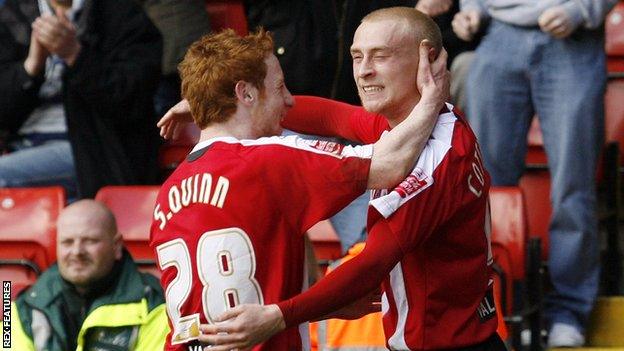David Cotterill: Wales winger opens up about depression
- Published
David Cotterill on his depression battle
Warning: this article contains content which you may find upsetting.
Feeling he had nowhere else to turn, David Cotterill would try anything to distract his mind from his own thoughts.
There were times he'd be sat in a hotel room on international duty, spending hours painstakingly piecing together his latest Lego construction.
Teammates would raise eyebrows, but wouldn't pick up on the clues. His kids aren't with him. He's not just passing time. He's desperately trying to block out his own thoughts. Thoughts that would take him to dark places, even at one stage to contemplate suicide.
The 30-year-old knows such moments are some of his lowest in a battle he has fought with depression since his teens, moments that have proven far harder for him to forget than they are to talk about.
There were times when the Wales winger was stopped by the restraint and tears of his wife, feeling like he could no longer go on.
These were times and moments he would never dare discuss in front of managers or team-mates, fearful more of the consequences of opening up than of death.
'Didn't want to face the world'
These were the darkest days of Cotterill's mental struggles, which he has carried with him through a career of more than 400 games for Birmingham, Swansea, Sheffield United, Doncaster and Wigan, including 24 caps for his country.
The Cardiff-born midfielder says he had most of the material things many would dream of: the cars, the house, the wages and the fulfilled boyhood ambition of playing in the Premier League and on the international stage.
This was all by the age of 17, all ultimately irrelevant to Cotterill, all overshadowed by a realisation that the depression and anxiety he has felt from schooldays was consuming him.
Football provided a release, but not the support.
"When you're around others the conversations are flowing and you tend to not have time to think about it, you're looking forward to going out to train," Cotterill says, speaking publicly for the first time about his struggles.
"But there would be times when I finished training and I couldn't wait to go and lie in bed. I'd be there for hours.
"Particularly in the off-season, I'd just spend three or four days at a time not even eating, just thinking the worst things you can imagine and not actually sleeping at all. You'd stay there because you didn't want to face the world."

David Cotterill's highs on the football pitch were in marked contrast to his lows away from it
Cotterill says he always "sensed he was a little bit different"; that it was more than just the typical teenage difficulties.
He says the excitement of his early career - he had already become Wales' then-second youngest international in 2005 before a £2m move to the Premier League with Wigan from Bristol City - stopped him focusing on what was always in the background. It did not last.
"I had an Aston Martin, the big house, anything a person could want - but you can't help what's in the brain," he concedes.
"It's the most powerful tool you have and what you feel can block out everything you have. And when you're fighting that battle every day, it takes its toll."
Cotterill explains the hardest periods were often when he wasn't playing, not because of being out of the team, but being unable to have what he calls his 'release'.
"When I didn't have that, it would double, triple what you'd have in your head," he says.
'How can you do that when you have children, a wife?'
Drink became a crutch, but it only, eventually, exacerbated the issues. A false sense of control built up into both rages and moments of clarity when he wanted it to end.
Cotterill recalls: "In the early stages, I'd always have to go and have a drive where I would spend hours in the car and think a lot of bad things.
"I've searched for the easiest way to commit suicide. Then you think, how can you do that when you have children, a wife?
"You kind of then have a couple of days when you feel OK again, but it keeps repeating itself."
Cotterill says he realised he was in "a dark place", although neither team-mates nor managers would ever know, something he believes is part of both his and football's problem with depression.
In long periods on the road, he says plenty might have attempted conversations with him and "I wouldn't be there" but, in general, he says they would also describe him as "one of the liveliest in the dressing room".
He was never tempted to let them in.
'There's footballers all over the country who feel this way'

England full-back Danny Rose is one of a handful of professional footballers to have admitted they suffer from depression
"Put it this way, if I went to a manager and said I'm struggling mentally, I need a break or I need a little bit of help, there's no way he's playing me on a Saturday or a Tuesday," Cotterill says.
"He would say 'he's not mentally stable, he's not mentally up for it' - and my release was to go and play.
"I guarantee there's footballers all over the country who feel this way. They won't tell the manager because they're not going to jeopardise their place, they're not going to jeopardise their earnings to look after their family, so they're parking this to one side.
"I don't think you can go to the manager or club and say, 'by the way I'm not coming in today, I'm going to see a doctor because mentally I'm not feeling great'. It's not possible."
Cotterill credits his wife of two-and-a half years for making a big change to how he's learned to cope with his mental illness, adding that "without her I probably wouldn't be here today".
It was her he first opened up to, saying he had "parked" for too long because of football.
Using Lego as therapy
Cotterill would use Lego as a way of distracting him during long hours in hotel rooms, team-mates not picking up on the clues of the therapeutic nature of constructing toy brick buildings.
Without a club after his release from Birmingham and a short-lived spell in India, cooking is his latest focus.
Counselling and regular contacts with a therapist have helped. He took a personal decision to opt against the support of the Professional Footballers' Association (PFA) because he wanted to go "outside of football", though he accepts they could be the best choice for others who he encourages to "find that person you can speak to".
"I feel better for speaking about it," he says, with one of the reasons for breaking his silence being to help others feel more able to talk about issues honestly.
"When I spoke to my wife more about it I actually felt better. Your rash decisions and what you're doing doesn't make sense, but if you explain it more you're getting it off your chest and people can better understand why you act the way you act."
Yet, pointing to the difference to the everyday workplace, the winger has his doubts if the football industry can change anytime soon.
"I truly believe if a manager or club finds out they'd use it as a weapon to not play you. If you're the big man or big dog in that football team you potentially might get help; if you're just a number in that squad I don't think you're getting the help you deserve or need," Cotterill says.
"If we're trying to protect injuries, knee injuries, foot injuries, whatever it might be, then why are we not protecting the brain, I don't get it. We definitely need to look into it.
"If everyone was open and honest (in football) about depression there would be a scary number. A huge number."
Cotterill talks about being encouraged by his counselling to take the little steps rather than the big ones
But he knows going public is his biggest stride forward in a battle he admits he might never win, but simply learn to better deal with and manage.
And this time he is not concerned with the sporting consequences, saying: "If talking about it affects me from signing somewhere else then I don't want to continue to play football."
If you have been affected by the issues raised in this article you can find the details of organisations offering support via Action Line.